Tuesday, November 26. 2013
By Bus from Almaty/Kazakhstan to Yining/China
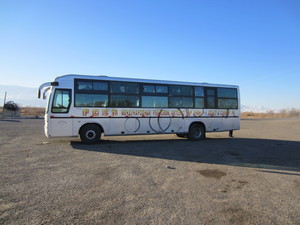
Our bus
I read at some places about a different possibility: A bus service from Almaty to Yining (伊宁 which, to make things complicated, has also a kazakh/uighur name - Kulja / Құлжа / قۇلجا - which, to make things even more complicated, can be written in many different ways using latin characters, cyrillic characters or arabic characters). The information was quite scarce. I basically only had a few forum entries mentioning it, so all the information I had seemed quite unreliable. And even the guy from the hostel where I stayed didn't know more.
I could find out that there's an international bus station in Almaty called Sayran (сайран). It is located somewhat outside the city and can be reached with bus number 100 from the Almaty 2 train station. I went there on Thursday and - although without language communication possible - could tell them what I wanted. They wrote me down a date and time for the next bus: Saturday at seven in the morning. Sadly, I didn't find out how often this bus goes. Saturday was fine for me so I bought my ticket for the bus.
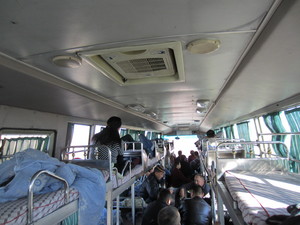
Beds and most people sitting on the floor
We spend about an hour at a restaurant in the middle of the desert and also some time at the border. I was a bit worried about the border crossing, because recently there have been some conflicts in the Xinjiang province, which is the chinese province you enter when coming from Kazakhstan. But at the border everything was fine, except that my border crossing took a bit longer than the others.
Right behind the border a lot of people were trying to offer money exchange. I didn't do that, because at such points you usually don't get the best exchange rates, which later turned out to be a mistake. It seems not exactly easy to change Tenge into Renminbi in Yining and as I'm writing this, I still have some Kazakh money with me after having tried to exchange it in three different banks in Yining.
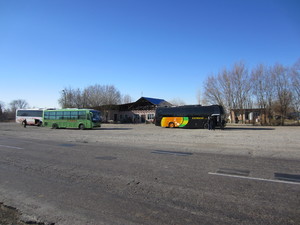
Lunch break in the desert - this really felt like being in the middle of nowhere
Hopefully this information will provide other travellers some help when they try to take this bus. To recap the important information:
- Bus from Almaty to Yining starts at Sayran bus station (reachable via local bus 100 from Almaty 2 train station).
- Runs at 07:00 a.m. on unknown weekdays, but due to my experiences probably on fridays and not on thursdays (If you have any info on that, e. g. a link to the bus company, please add it in the comments).
- Costs 4600 Tenge (thats about 21 € or 30 US$).
- Takes about 12 hours.
- Crosses border to China at Khorgas (霍尔果斯 in mandarin chinese, قورعاس in uighur, Хоргос in russian and Қорғас in kazakh language).
Pictures from bus trip
Saturday, November 23. 2013
Almaty and the little Alps
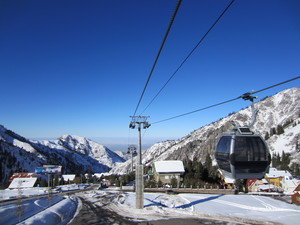 After Astana I went on to Almaty, which is the former capital of Kazakhstan. As I already wrote my previous two stops (Petropavl and Astana) were sharp contrasts, Almaty again was a completely different place. While also relatively expensive, it doesn't have the kind of "artificial" feeling that is present in Astana.
After Astana I went on to Almaty, which is the former capital of Kazakhstan. As I already wrote my previous two stops (Petropavl and Astana) were sharp contrasts, Almaty again was a completely different place. While also relatively expensive, it doesn't have the kind of "artificial" feeling that is present in Astana.I spend two days here. Almaty has some mountains surrounding it. There are two hilltops that one can reach via cable car. One is Koktobe, which has something like a small amusement park on the top. But due to lots of snow, most things there were closed. For the free software fans upon my readers: I saw an arcade machine with Tuxracer there. Never seen Tuxracer in an arcade machien before (however, I have seen an arcade machine with the free software game Stepmania on my last trip).
The other cable car starts near the ice skating stadium Medeo (which can be reached via public bus line 6) and goes to the ski ressort Shymbulak. The ski resort was closed and sadly, this meant that also the second cable car, which could bring one even more up the hills, was also closed. Still I had some stunning views on the mountains. In the gondola, I talked to a local who spoke a bit of English. He said they call it the "little Alps". I found that quite described it well. It really looked like you were in Austria or Switzerland. To make this impression complete, the cable car was even built in Switzerland.
Pictures from Almaty
Friday, November 22. 2013
Astana - the Dubai of Kazakhstan
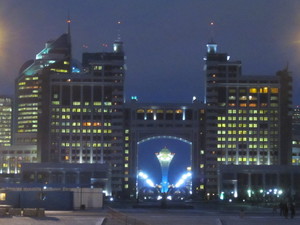
Baiterek from the West ...
I am glad that I've been both in an I assume average Kazakh city like Petropavl and the capital Astana. The contrast was pretty extreme. It wasn't like going to another city in the same country, it felt more like going to another world. Petropavl looked more or less like many post-soviet cities I've been before. Often a bit shabby, with waste laying around, broken or non-existent sidewalks and alike.
Astana is quite the opposite. Nothing here is old, large parts of Astana were build within the last two decades. Dirt or waste in the streets was almost zero and the traffic seems pretty civilized. Until 1997, Almaty was the capital of Kazakhstan, due to some complicated political compromises, it was moved to Astana and there began the growth of this boom town.
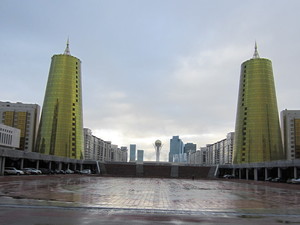
... and from the East
One thing that's notably missing in Astana: It has only a very limited public transport system. There's no metro, no tram and no trolleybusses. Normal busses are the only way to get around. In the evening, they are so crowded that it can be a pain to use them. Also, it's a bit tricky to find out which busses you want to take. Bus stations have sometimes maps with bus lines, but they don't show all bus lines, only the ones starting at exactly that bus stop. I didn't see any complete bus map anywhere offilne or online. I've pictured a bus map (and another one) which features some of the more important lines linking the city center with the train station, maybe this is of some help for other travellers.
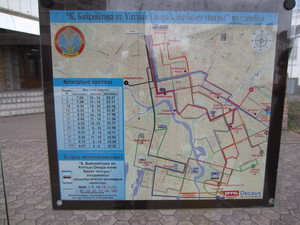
Astana Bus map
I originally planned to stay until saturday and take the train to China from Astana, but I found that the options of exploring the city were quite limited. You pretty quickly get around having seen all of its sights and there doesn't seem much around worth visiting. So I went on to Almaty.
A quick overview of things one can do and i did in Astana:
- Go on Baiterek tower: Not too expensive and nice view on the city with signs of distances to other relevant cities (e. g. Beijing 3656 km, Moscow 2280 km, Helsinki 3020 km).
- Ocenarium in the Duman entertainment center: Not that cheap, but nice and quite relaxing atmosphere. Biggest attraction are two large tunnels under a big aquarium, so you can watch the fishes from below.
- Pyramid (Palace of Peace and Reconciliation): Pyramid formed building containing an opera, conference centers and more. Not really worth visiting, it was mostly boring. I was the only english speaking person at that time, which didn't stop them from giving me a guided tour through the building.
- Khan Shatyry: Mostly a shopping center (so not thatwah interesting, except for the fact that it's a tent-like architecture). The upper floor contains a mix of an amusement park and an arcade hall. I saw a lot of those entertainment complexes, most other shopping centers in Astana have something alike. Also, there's a "Beach Club", which is a very expensive swimming bath.
- Watch unusual architecture: All over the city center.
Pictures from Astana
Posted by Hanno Böck
in English, Life
at
13:36
| Comments (0)
| Trackbacks (0)
Defined tags for this entry: architecture, asia2013, astana, baiterek, kazakhstan, khanshatyry, petropavl, travel
Thursday, November 21. 2013
Visa Registration in Kazakhstan
When I crossed the border to Kazakhstan I was told that I had to register my visa within 5 days. I read about that before, but I thought I had read somewhere that this wasn't necessary for EU citizens, so I was a bit surprised. But it turned out registration wasn't that difficult.
I did the registration on Monday in Astana. Registration needs to be done at the Migration Police office, which is located in the улица Сакена Сейфулина 29. I was there at 11:00 and the place was quite crowded and busy, so I already feared this might take some time. But it only took a couple of minutes, I gave them my passport, my migration card and a business card of my hotel (they wanted to know the adress). Then I was told to come back at 15:00. I was also told that they could only do a registration for a maximum of ten days. This wasn't a problem for me, because I don't intend to stay longer in Kazakhstan and my Visa validity ends there anyway. But for travellers wanting to stay longer in Kazakhstan this might be a cause of trouble.
After all, it wasn't that troublesome, but you should be aware of the registration when travelling to Kazakhstan. I don't know what to do if you're not passing a big city and thus have no way to visit the office of the migration police.
I did the registration on Monday in Astana. Registration needs to be done at the Migration Police office, which is located in the улица Сакена Сейфулина 29. I was there at 11:00 and the place was quite crowded and busy, so I already feared this might take some time. But it only took a couple of minutes, I gave them my passport, my migration card and a business card of my hotel (they wanted to know the adress). Then I was told to come back at 15:00. I was also told that they could only do a registration for a maximum of ten days. This wasn't a problem for me, because I don't intend to stay longer in Kazakhstan and my Visa validity ends there anyway. But for travellers wanting to stay longer in Kazakhstan this might be a cause of trouble.
After all, it wasn't that troublesome, but you should be aware of the registration when travelling to Kazakhstan. I don't know what to do if you're not passing a big city and thus have no way to visit the office of the migration police.
Sunday, November 17. 2013
Petropavl in northern Kazakhstan
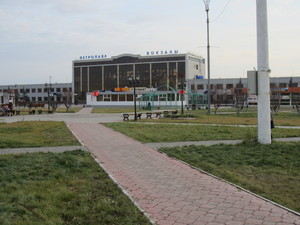 After a two-night train trip I arrived in Kazakhstan in the town Petropavl / Петропавл, also known under the name Petropavlovsk (which should not be confused with Petropavlovsk in Russia, where a town with the same name exists). There was no particular reason why I went there except that there's a relatively fast train from Moscow. Going directly from Moscow to Kazakhstan's capital Astana or the ex-capital Almaty would've meant a trip with at least three nights in a train, which I thought would be too much.
After a two-night train trip I arrived in Kazakhstan in the town Petropavl / Петропавл, also known under the name Petropavlovsk (which should not be confused with Petropavlovsk in Russia, where a town with the same name exists). There was no particular reason why I went there except that there's a relatively fast train from Moscow. Going directly from Moscow to Kazakhstan's capital Astana or the ex-capital Almaty would've meant a trip with at least three nights in a train, which I thought would be too much.There's surprisingly little information you find online about Petropavl in English, although it's not that small (about 200.000 inhabitants). I can't add that much, as I only stayed for one night.
I had a booking for a hotel, which teached me a little lesson: Sometimes preparing to much may cause more hassle than it helps. I didn't find the hotel I've booked at the address where it was supposed to be. You may wonder how I fail to find a hotel, but you need to know that "hotel" here not necessarily means the same as you are used to be (big building with big sign "Hotel XY"). They're often hidden in flats inside normal buildings.
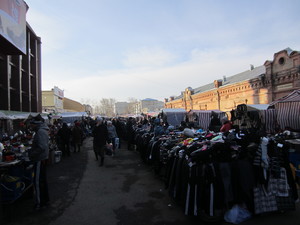 After checking the booking again I found out that it listed two addresses. One for the apartment and one as the contact address - and they were not nearby. No hint where I was supposed to go. While searching for my hotel, I found three other hotels which, by the way, were all much cheaper than everything that was bookable online. So finally I decided to forget my booking and just took one that seemed okay. Luckily, I could cancel my other booking without costs (I would've complained if I hadn't been able to do so) and ended up in a fine apartment, cheaper than planned and with a kitchen.
After checking the booking again I found out that it listed two addresses. One for the apartment and one as the contact address - and they were not nearby. No hint where I was supposed to go. While searching for my hotel, I found three other hotels which, by the way, were all much cheaper than everything that was bookable online. So finally I decided to forget my booking and just took one that seemed okay. Luckily, I could cancel my other booking without costs (I would've complained if I hadn't been able to do so) and ended up in a fine apartment, cheaper than planned and with a kitchen.Notable in Petropavl was a huge outdoor market. Although it's quite cold, it was crowded and seemed to be the normal way of shopping here. Not only food was sold, but anything from clothes to tools or car parts.
After spending a night, I took the train to the capital Astana.
Pictures Train Moscow-Petropavl
Pictures from Petropavl
Friday, November 15. 2013
Moscow and the Museum of Soviet Arcade Machines
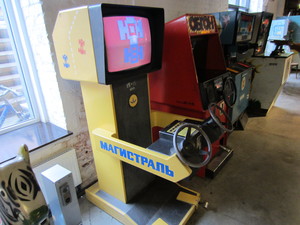 I had about six hours time in Moscow before entering my next train. A bit too much time for getting from one train station to another, eating and sitting around. So I looked for something to do while being in Moscow. I already visited the basic sights like the Red Square last time I was in Moscow, so I was looking for something more unusual.
I had about six hours time in Moscow before entering my next train. A bit too much time for getting from one train station to another, eating and sitting around. So I looked for something to do while being in Moscow. I already visited the basic sights like the Red Square last time I was in Moscow, so I was looking for something more unusual.I checked the Wikivoyage page of Moscow and one of the first things it mentions is the Museum of Soviet Arcade Machines. That sounded like it's worth a visit. I checked the location and it is quite centrally located, only a few minutes walk from the Metro station Baumanskaya. (If you exit the metro, you're already on Baumanskaya street and the Museum is in Baumanskaya street 11.)
As the name says, the museum features arcade machines from the soviet aera. You get a couple of real soviet 15 Kopek coins when entering that you can spend on playing. So I played some rounds of Magistral (Магистраль) - seems something like the soviet answer to Pacman - and others. Honestly, for many of the games I failed to understand how they were supposed to be played. What was interesting that there were a couple of "games" that featured non-virtual content. For example, there was a game where you could control a little toy tank called Tankodrom (танкодром), but I didn't really understand how to play that game either. Obviously there were quite a number of games with cold war references. The Museum also includes some tables where you can have a coffee after playing. If you ever happen to be in Saint-Petersburg, the museum has a branch there, too.
After that I went to Kazansky railway station where my next train was leaving. Moscow has several train stations and some of them are named after the countries where their international trains are heading. So for me that meant I entered Moscow at the Belorussky railway station (because I came through Belarus) and I left at Kazansky railway station (because I was heading to Kazakhstan). (someone in the comments told me this is wrong and Kazaksny station refers to the city Kazan - so I was probably wrong on this naming)
Pictures from the Museum of Soviet Arcade Machines in Moscow
Posted by Hanno Böck
in Computer culture, English, Life, Retro Games
at
16:45
| Comment (1)
| Trackbacks (0)
Defined tags for this entry: arcade, asia2013, computerhistory, magistral, moscow, museum, retro, retrogames, russia, tankodrom
Entering Russia and the migration card
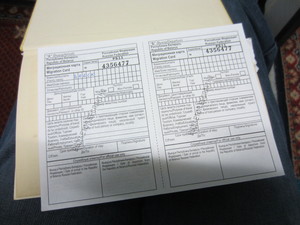
Russian migration card
The migration card is a double-form where you have to fill in some of your basic data. It's then stamped by the border guards and split in half. They keep one half, you get the other and keep it until you leave the country again. From what I've heard, one of the more troublesome things you can encounter is losing your migration card while in Russia.
There are some tricky things to know about the migration card. First: If you enter Russia through Belarus, you'll get only one migration card for both countries. That bothered me a lot on my last trip, because I only entered the data for Belarus, that means a stay of one day. Turned out this wasn't a big issue. When leaving Russia the border guards had a more closer look on the documents and obviously noticed the misinformation, but they didn't seem to care that much.
There seem to be similar issues with other countries. I even once got a migration card at the Ukrainian border, where I didn't want to enter Russia at all. It just happened that I was sitting in a train that was going to Russia after crossing the Ukraine. So if you ever happen to enter Russia through another country, although you don't necessarily get the migration card at the Russian border, you should enter the data for your stay in Russia.
Another thing I learned this time: There is a field for the Visa number. Now I obviously had two Visa - one for Belarus and one for Russia. I filed the number of the Russian one, because after all, I wanted to go to Russia and only cross Belarus on a train. Turned out I was wrong and the Belarus border guards complained. Admittedly, it can be a bit frightening if a border guard tells you something is wrong, especially if you don't understand their language. But after all, he just filled in the correct Visa number himself and everything was okay.
Kazakhstan also has a migration card, but it is not split in half and no similar pitfalls seem to occur there.
Tuesday, November 12. 2013
Travelling again
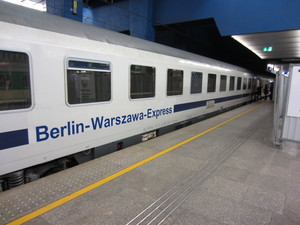 If you've been reading my blog back in 2011, you'll remember that I did a two-month-long trip on the transsiberian railway through Russia, Mongolia and China. Ever since the idea was in my head that I wanted to do something alike again.
If you've been reading my blog back in 2011, you'll remember that I did a two-month-long trip on the transsiberian railway through Russia, Mongolia and China. Ever since the idea was in my head that I wanted to do something alike again.So today I am starting a new journey to Asia, again mostly by train. Slightly modified from last time, as I don't need to see all the places again I've already been. I started today at 6 am in Berlin and I'm currently in Warsaw, Poland (where the 19th world climate conference is just starting, but that's purely a coincidence). I'll only spend a couple of hours in Warsaw and then will continue my trip to Moscow. From there, I'll head on to Kazakhstan and later to China. If everything works out as intended, I'll hopefully spend parts of the winter in warm and sunny areas.
I make no promises, but I'll try to keep my blog updated with pictures and events happening on my trip.
Technical note: All entries related to this trip will be marked with the tag asia2013. All entries related to my previous trip to asia can be found under the tag trip2011. Pictures will be collected here.
Sunday, October 20. 2013
Strange places - the Crooked Forest
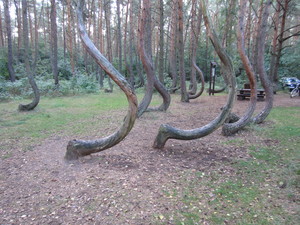 Some time ago I stumbled upon this webpage, which lists a couple of extraordinary travel destinations.
Some time ago I stumbled upon this webpage, which lists a couple of extraordinary travel destinations.One of them catched my attention: The so-called "Crooked Forest" near Gryfino in Poland. Now, it certainly isn't the most spectacular on that list. But it has one special feature which makes it interesting for me: From where I live (Berlin) it's not very far. So recently I went there by train and bike and had a look.
The Crooked Forest are a couple of pines that grow in really weird shapes, as you can see in the picture on the right. It is not entirely certain what the reason for those weird-looking trees is. Wikipedia has some information, which - interestingly - is different in the english and german article about it.
Some more pictures of the Crooked Forest
Sunday, September 29. 2013
226 Kilowattstunden
 Ich habe gerade die Jahresabrechnung von meinem Stromanbieter bekommen. 452 Kilowattstunden für einen 2-Personen-Haushalt. Zum Vergleich: Der Durchschnitt liegt bei circa 3200 Kilowattstunden. Mein Stromanbieter sagt mir, dass 1000-2000 Kilowattstunden in meinem Fall bereits "sehr gut" wären - mein Stromverbrauch ist in der dargestellten Übersicht überhaupt nicht vorgesehen.
Ich habe gerade die Jahresabrechnung von meinem Stromanbieter bekommen. 452 Kilowattstunden für einen 2-Personen-Haushalt. Zum Vergleich: Der Durchschnitt liegt bei circa 3200 Kilowattstunden. Mein Stromanbieter sagt mir, dass 1000-2000 Kilowattstunden in meinem Fall bereits "sehr gut" wären - mein Stromverbrauch ist in der dargestellten Übersicht überhaupt nicht vorgesehen.Zugegeben hab ich einige Vorteile, auf die man zumindest als Mieter meist wenig Einfluss hat. Die Wohnung hat einen Gasherd und die Heizung läuft via Fernwärme. Die in vielen Wohnungen größten Stromverbraucher fallen damit weg. Ansonsten mache ich aber nur Dinge, die relativ banal sind:
- Beim Kauf von *allen* elektronischen Geräten versuche ich auf den Stromverbrauch zu achten. Leider ist das oft schwierig - denn in vielen Fällen verschweigen einem die Hersteller den Stromverbrauch.
- Besonderes augenmerk auf a) Großgeräte und b) Geräte, die permanent laufen. Das bedeutet vor allem: Kühlschrank und Waschmaschine sollten sparsam sein, aber auch so Dinge wie Telefon, Router oder Modem. Die brauchen zwar nicht viel, laufen aber immer oder fast immer.
- Alle Geräte, die aktuell nicht gebraucht werden, werden ausgeschaltet. Für meinen Schreibtisch bedeutet das etwa: Eine Steckdosenleiste, an der sich jede Dose einzeln abschalten lässt.
- Geräte, die multifunktional sind und sowieso wenig Strom brauchen, sollte man auch multifunktional nutzen. Beispiel Laptop: Die sind generell sehr stromsparend, damit der Akku lange hält. Einen Desktop-PC zu nutzen, wenn es der Laptop auch tut, ist sinnlos. Musik und Filme kann man ebenfalls damit abspielen.
(Bildquelle: Wikimedia Commons)
Wednesday, July 17. 2013
Stuff and Minimalism
It was about a year ago when I first read about a movement of people calling themselves "Minimalists". The basic idea is: Live with less stuff - because most likely you won't need much of it. I quickly became fascinated by the idea and would call myself a Minimalist today.
I've never been someone to own a lot of stuff. But still, when I gathered through my belongings I could find a whole lot of things I haven't used in ages. I kept far too much stuff, just because "I might need it some day". A small example might illustrate this: I had a 10 meter audio cable. I used it back when I was a kid to connect my PC with my hi-fi system. I haven't used it for more than 10 years. I've carried it around through several different flats. I had the thought in the back of my mind that "this cable wasn't that cheap". I did a quick check: A similar cable costs around 4 Euro, shipping included. If I ever needed one again I could easily get it. Now a single cable isn't relevant. But I had two boxes full of electronics that I got rid of. I was baffled how much stuff I just could get rid of without missing it at all.
This may all sound very banal, but it has very practical advantages. After all, you have to store your stuff somewhere - basically you're paying rent for it. It makes moving more difficult. It makes cleaning your home more difficult. But beside that, I feel another advantage, one that I've more problems to describe. It's a feeling of freedom. Somehow I felt responsible for "my stuff". There's all this stuff and I basically have no overview what's in it. There may be things that cause me trouble. Not that I had anything specific in mind or that I could name the kind of "trouble" I was thinking of. It was just a vague feeling. It just feels better to think "I basically know my stuff". I couldn't name every single piece, but as of today I'm pretty sure that there's nothing in it that would surprise me.
There's a whole bunch of webpages and blogs around Minimalism on the web. If you're curious, a good starting point might be theminimalists.com by two guys named Joshua Fields Millburn and Ryan Nicodemus.
I've never been someone to own a lot of stuff. But still, when I gathered through my belongings I could find a whole lot of things I haven't used in ages. I kept far too much stuff, just because "I might need it some day". A small example might illustrate this: I had a 10 meter audio cable. I used it back when I was a kid to connect my PC with my hi-fi system. I haven't used it for more than 10 years. I've carried it around through several different flats. I had the thought in the back of my mind that "this cable wasn't that cheap". I did a quick check: A similar cable costs around 4 Euro, shipping included. If I ever needed one again I could easily get it. Now a single cable isn't relevant. But I had two boxes full of electronics that I got rid of. I was baffled how much stuff I just could get rid of without missing it at all.
This may all sound very banal, but it has very practical advantages. After all, you have to store your stuff somewhere - basically you're paying rent for it. It makes moving more difficult. It makes cleaning your home more difficult. But beside that, I feel another advantage, one that I've more problems to describe. It's a feeling of freedom. Somehow I felt responsible for "my stuff". There's all this stuff and I basically have no overview what's in it. There may be things that cause me trouble. Not that I had anything specific in mind or that I could name the kind of "trouble" I was thinking of. It was just a vague feeling. It just feels better to think "I basically know my stuff". I couldn't name every single piece, but as of today I'm pretty sure that there's nothing in it that would surprise me.
There's a whole bunch of webpages and blogs around Minimalism on the web. If you're curious, a good starting point might be theminimalists.com by two guys named Joshua Fields Millburn and Ryan Nicodemus.
Posted by Hanno Böck
in English, Life
at
22:19
| Comments (0)
| Trackbacks (0)
Defined tags for this entry: minimalism, stuff
Thursday, May 9. 2013
In eigener Sache - Umbau
Seit 2004 existiert nun dieses Blog von mir. Zeitweise viel genutzt, zeitweise weniger und in letzter Zeit kaum noch. Ein privates Projekt, ein Ort, an dem ich schreiben konnte was ich wollte.
Zwischenzeitlich hat sich bei mir einiges geändert. Ich schreibe weiterhin viel und gern, aber selten hier. Ich bin inzwischen primär als freier Journalist tätig und meine Texte können unter anderem bei der taz, bei Golem, bei Telepolis und gelegentlich sogar bei Zeit online gelesen werden. Mein Blog entwickelte sich zum unpassenden Relikt, gleichzeitig habe ich das Gefühl, dass ich endlich eine Selbstdarstellungsseite für meine journalistische Arbeit benötige und mein Blog dafür in seiner aktuellen Form denkbar ungeeignet ist.
Deshalb wird jetzt hier umgebaut. Mein Blog soll weiter existieren, zum einen natürlich als Archiv und zum anderen soll es nicht ganz sterben. Es wird immer wieder Anlässe geben, die für einen Blogeintrag besser geeignet sind als für einen journalistischen Text. Und wer weiß, je nach Laune wird es vielleicht auch wieder lebendiger.
Das Blog wird künftig unter blog.hboeck.de beheimatet. Abgesehen von der Startseite werden alle alten Links umgeleitet. Probleme bereiten könnte das für manche Feedreader und Aggregatoren. Alles, was HTTP-Redirects versteht, sollte weiter seine Inhalte finden.
Unter der Hauptdomain hboeck.de soll dann irgendwann ein Überblick über meine journalistische Arbeit zu finden sein. Vorerst gibt's hier auch schon eine notdürftige Übersicht über von mir verfasste Beiträge in anderen Medien.
Zwischenzeitlich hat sich bei mir einiges geändert. Ich schreibe weiterhin viel und gern, aber selten hier. Ich bin inzwischen primär als freier Journalist tätig und meine Texte können unter anderem bei der taz, bei Golem, bei Telepolis und gelegentlich sogar bei Zeit online gelesen werden. Mein Blog entwickelte sich zum unpassenden Relikt, gleichzeitig habe ich das Gefühl, dass ich endlich eine Selbstdarstellungsseite für meine journalistische Arbeit benötige und mein Blog dafür in seiner aktuellen Form denkbar ungeeignet ist.
Deshalb wird jetzt hier umgebaut. Mein Blog soll weiter existieren, zum einen natürlich als Archiv und zum anderen soll es nicht ganz sterben. Es wird immer wieder Anlässe geben, die für einen Blogeintrag besser geeignet sind als für einen journalistischen Text. Und wer weiß, je nach Laune wird es vielleicht auch wieder lebendiger.
Das Blog wird künftig unter blog.hboeck.de beheimatet. Abgesehen von der Startseite werden alle alten Links umgeleitet. Probleme bereiten könnte das für manche Feedreader und Aggregatoren. Alles, was HTTP-Redirects versteht, sollte weiter seine Inhalte finden.
Unter der Hauptdomain hboeck.de soll dann irgendwann ein Überblick über meine journalistische Arbeit zu finden sein. Vorerst gibt's hier auch schon eine notdürftige Übersicht über von mir verfasste Beiträge in anderen Medien.
Posted by Hanno Böck
in Life
at
15:44
| Comments (0)
| Trackbacks (0)
Defined tags for this entry: blog
Saturday, January 26. 2013
Explain hard stuff with the 1000 most common words #UPGOERFIVE
Based on the XKCD comic "Up Goer Five", someone made a nice little tool: An online text editor that lets you only use the 1000 most common words in English. And ask you to explain a hard idea with it.
Nice idea. I gave it a try. The most obvious example to use was my diploma thesis (on RSA-PSS and provable security), where I always had a hard time to explain to anyone what it was all about.
Well, obviously math, proof, algorithm, encryption etc. all are forbidden, but I had a hard time with the fact that even words like "message" (or anything equivalent) don't seem to be in the top 1000.
Here we go:
When you talk to a friend, she or he knows you are the person in question. But when you do this a friend far away through computers, you can not be sure.
That's why computers have ways to let you know if the person you are talking to is really the right person.
The ways we use today have one problem: We are not sure that they work. It may be that a bad person knows a way to be able to tell you that he is in fact your friend. We do not think that there are such ways for bad persons, but we are not completely sure.
This is why some people try to find ways that are better. Where we can be sure that no bad person is able to tell you that he is your friend. With the known ways today this is not completely possible. But it is possible in parts.
I have looked at those better ways. And I have worked on bringing these better ways to your computer.
So - do you now have an idea what I was taking about?
I found this nice tool through Ben Goldacre, who tried to explain randomized trials, blinding, systematic review and publication bias - go there and read it. Knowing what publication bias and systematic reviews are is much more important for you than knowing what RSA-PSS is. You can leave cryptography to the experts, but you should care about your health. And for the record, I recently tried myself to explain publication bias (german only).
Nice idea. I gave it a try. The most obvious example to use was my diploma thesis (on RSA-PSS and provable security), where I always had a hard time to explain to anyone what it was all about.
Well, obviously math, proof, algorithm, encryption etc. all are forbidden, but I had a hard time with the fact that even words like "message" (or anything equivalent) don't seem to be in the top 1000.
Here we go:
When you talk to a friend, she or he knows you are the person in question. But when you do this a friend far away through computers, you can not be sure.
That's why computers have ways to let you know if the person you are talking to is really the right person.
The ways we use today have one problem: We are not sure that they work. It may be that a bad person knows a way to be able to tell you that he is in fact your friend. We do not think that there are such ways for bad persons, but we are not completely sure.
This is why some people try to find ways that are better. Where we can be sure that no bad person is able to tell you that he is your friend. With the known ways today this is not completely possible. But it is possible in parts.
I have looked at those better ways. And I have worked on bringing these better ways to your computer.
So - do you now have an idea what I was taking about?
I found this nice tool through Ben Goldacre, who tried to explain randomized trials, blinding, systematic review and publication bias - go there and read it. Knowing what publication bias and systematic reviews are is much more important for you than knowing what RSA-PSS is. You can leave cryptography to the experts, but you should care about your health. And for the record, I recently tried myself to explain publication bias (german only).
Posted by Hanno Böck
in Cryptography, English, Life, Science, Security
at
11:51
| Comments (0)
| Trackbacks (0)
Friday, November 9. 2012
Languages and translation technology
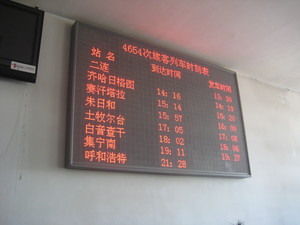 Just recently, Microsoft research has made some progress in developing a device to do live translations from English into Mandarin. I'd like to share some thoughts with you about that.
Just recently, Microsoft research has made some progress in developing a device to do live translations from English into Mandarin. I'd like to share some thoughts with you about that.If you read my blog on a regular basis, you will know that I traveled through Russia, Mongolia and China last year. If there's one big thing I learned on this trip, it's this: English language is - on a worldwide scale - much less prevalent than I thought. Call me a fool, but I just wasn't aware of that. I thought, okay, maybe many people won't understand English, but at least I'll always be able to find someone nearby who's able to translate. That just wasn't the case. I spent days in cities where I met nobody that shared any language knowledge with me.
I'm pretty sure that translation technologies will become really important in the not-so-distant future. For many people, they already are. I've learned about the opinions of swedish initiatives without any knowledge of swedish just by using Google translate. Google Chrome and the free variant Chromium show directly the option to send something through Google translate if it detects that it's not in your language (although that wasn't working with Mongolian when I was there last year). I was in hotels where the staff pointed me to their PC with an instance of Yandex translate or Baidu translate where I should type in my questions in English (Yandex is something like the russian Google, Baidu is something like the chinese Google). Despite all the shortcomings of today's translation services, people use them to circumvent language barriers.
Young people in those countries are often learning English today, but it's a matter of fact that this will only very slowly translate into a real change. Lots of barriers exist. Many countries have their own language and another language that's used as the "international communication language" that's not English. For example, you'll probably get along pretty well in most post-soviet countries with Russian, no matter if the countries have their own native language or not. This also happens in single countries with more than one language. People have their native language and learn the countries language as their first foreign language.
Some people think their language is especially important and this stops the adoption of English (France is especially known for that). Some people have the strange idea that supporting English language knowledge is equivalent to supporting US politics and therefore oppose it.
Yes, one can try to learn more languages (I'm trying it with Mandarin myself and if I'll ever feel I can try a fourth language it'll probably be Russian), but if you look on the world scale, it's a loosing battle. To get along worldwide, you'd probably have to learn at least five languages. If you are fluent in English, Mandarin, Russian, Arabic and Spanish, you're probably quite good, but I doubt there are many people on this planet able to do that. If you're one of them, you have my deepest respect (please leave a comment if you are).
If you'd pick two completely random people of the world population, it's quite likely that they don't share a common language.
I see no reason in principle why technology can't solve that. We're probably far away from a StarTrek-alike universal translator and sadly evolution hasn't brought us the Babelfish yet, but I'm pretty confident that we will see rapid improvements in this area and that will change a lot. This may sound somewhat pathetic, but I think this could be a crucial issue in fixing some of the big problems of our world - hate, racism, war. It's just plain simple: If you have friends in China, you're less likely to think that "the chinese people are bad" (I'm using this example because I feel this thought is especially prevalent amongst the left-alternative people who would never admit any racist thoughts - but that's probably a topic for a blog entry on its own). If you have friends in Iran, you're less likely to support your country fighting a war against Iran. But having friends requires being able to communicate with them. Being able to have friends without the necessity of a common language is a fascinating thought to me.
Posted by Hanno Böck
in Computer culture, English, Life
at
22:53
| Comments (0)
| Trackbacks (0)
Defined tags for this entry: babelfish, china, chinese, english, googletranslate, language, mandarin, russia, russian, translation, travel, universaltranslator
Saturday, October 6. 2012
mycare.de und die Zaubermedizin
Folgende Nachricht habe ich heute an die Onlineapotheke mycare.de geschrieben.
Sehr geehrte Damen und Herren,
Lassen Sie mich kurz etwas vorwegnehmen: Ich habe bereits einige Male bei mycare.de bestellt. Die Preise sind meist günstig und die Lieferungen erfolgten ohne Probleme. Ich teile auch nicht die kulturpessimistische Sorge mancher Zeitgenossen, die Onlineapotheken für schädlich oder gar für den Untergang des Abendlandes halten.
Meiner letzten bei Ihnen bestellten Lieferung lag eine Ausgabe des Magazins “Gesund durch Homöopathie”, herausgegeben von der Deutschen Homöopathie-Union (DHU), bei.
Homöopathie ist keine Medizin – es ist ein Glaubenssystem, das nicht auf wissenschaftlichen Fakten beruht. Homöopathische “Medikamente” bestehen aus Substanzen, die meist so hoch verdünnt sind, dass kein Molekül der Ursprungssubstanz mehr vorhanden ist. Nach den Ideen von Samuel Hahnemann, dem Erfinder der Homöopathie, führt die Verdünnung zu einer Verstärkung des Effekts.
Würde dies tatsächlich stimmen, müssten wir wohl große Teile der Biologie- und auch der Physikbücher umschreiben. So ist es kaum zu erklären, wie sich die Idee der potenzierten Information in Wasserlösungen mit so grundlegenden Dingen wie dem zweiten Hauptsatz der Thermodynamik in Einklang bringen lässt.
Aber – niemand muss die Physikbücher umschreiben, denn alles spricht dafür, dass es sich bei Homöopathie um Pseudomedizin handelt. Zahlreiche Metaanalysen kamen immer wieder zu dem selben Schluss: Bei homöopathischen Medikamenten wirkt lediglich der Placebo-Effekt.
Neben der Tatsache, dass es bei Homöopathie um Zaubermedizin geht, weise ich noch auf folgendes hin: Der Herausgeber der von ihnen verbreiteten Zeitschrift, die Deutschen Homöopathieunion, hatte erst kürzlich einen handfesten Skandal vorzuweisen. Sie finanzierte einen selbsternannten Journalisten, dessen Aufgabe darin bestand, Kritiker der Homöopathie anzuschwärzen. Die Details sind in einem Artikel der Süddeutschen Zeitung beschrieben, auf den ich hier gerne verweise [1].
Aber eigentlich brauche ich Ihnen das nicht zu erzählen. Denn ich gehe davon aus, dass auch bei einer Onlineapotheke Mitarbeiter mit medizinischem Sachverstand angestellt sind. Insofern wissen sie das alles längst, vermutlich besser als ich, der ich lediglich die Kompetenz eines Laien mit Interesse für Wissenschaft vorweisen kann.
Ich weiß nicht, was sie dazu motiviert, derart unwissenschaftliche Propaganda von einer Firma mit fragwürdigen Methoden zu verbreiten. Möglicherweise bekommen sie von der Deutschen Homöopathie-Union dafür Geld, möglicherweise denken sie, dass ihre Kunden derartige “Beigaben” schätzen. Ich halte es für schlicht unverantwortlich. Sie tragen dazu bei, dass unwissenschaftliches Denken gefördert wird. Als Apotheke – auch als Onlineapotheke – haben sie eine Verantwortung. Dazu gehört auch, Patienten keine unsachlichen oder falschen Informationen an die Hand zu geben. Ich werde mir gut überlegen, ob ich in Zukunft noch bei Ihnen einkaufen werde.
Mit freundlichen Grüßen,
Hanno Böck
P.S.: Diese Mail werde ich auf meinem privaten Blog veröffentlichen. Sollten Sie mir hierauf antworten (was ich begrüßen würde), werde ich die Antwort dort ebenfalls veröffentlichen.
[1] http://www.sueddeutsche.de/wissen/homoeopathie-lobby-im-netz-schmutzige-methoden-der-sanften-medizin-1.1397617
In der Hoffnung, dass ich nicht der einzige bin und irgendwann Apotheken damit aufhören, Hokuspokus als Medizin zu verkaufen.
Update: mycare.de hat geantwortet:
Homöopathie ist eine in Deutschland anerkannte alternativmedizinische Behandlungsmethode. So haben Arzt und Patient die Möglichkeit, neben der klassischen Medizin auch die der Homöopathie zu wählen. Viele Kunden von mycare zeigen aufgrund ihrer Bestellungen Interesse an der Homöopathie. Wir möchten dem Wunsch unserer Kunden gerecht werden und informieren daher regelmäßig mit unterschiedlichen Beilagen zu diesem Thema. Eine Beilagensperre können wir für Ihr Konto selbstverständlich einrichten, sofern Sie das wünschen.
Sehr geehrte Damen und Herren,
Lassen Sie mich kurz etwas vorwegnehmen: Ich habe bereits einige Male bei mycare.de bestellt. Die Preise sind meist günstig und die Lieferungen erfolgten ohne Probleme. Ich teile auch nicht die kulturpessimistische Sorge mancher Zeitgenossen, die Onlineapotheken für schädlich oder gar für den Untergang des Abendlandes halten.
Meiner letzten bei Ihnen bestellten Lieferung lag eine Ausgabe des Magazins “Gesund durch Homöopathie”, herausgegeben von der Deutschen Homöopathie-Union (DHU), bei.
Homöopathie ist keine Medizin – es ist ein Glaubenssystem, das nicht auf wissenschaftlichen Fakten beruht. Homöopathische “Medikamente” bestehen aus Substanzen, die meist so hoch verdünnt sind, dass kein Molekül der Ursprungssubstanz mehr vorhanden ist. Nach den Ideen von Samuel Hahnemann, dem Erfinder der Homöopathie, führt die Verdünnung zu einer Verstärkung des Effekts.
Würde dies tatsächlich stimmen, müssten wir wohl große Teile der Biologie- und auch der Physikbücher umschreiben. So ist es kaum zu erklären, wie sich die Idee der potenzierten Information in Wasserlösungen mit so grundlegenden Dingen wie dem zweiten Hauptsatz der Thermodynamik in Einklang bringen lässt.
Aber – niemand muss die Physikbücher umschreiben, denn alles spricht dafür, dass es sich bei Homöopathie um Pseudomedizin handelt. Zahlreiche Metaanalysen kamen immer wieder zu dem selben Schluss: Bei homöopathischen Medikamenten wirkt lediglich der Placebo-Effekt.
Neben der Tatsache, dass es bei Homöopathie um Zaubermedizin geht, weise ich noch auf folgendes hin: Der Herausgeber der von ihnen verbreiteten Zeitschrift, die Deutschen Homöopathieunion, hatte erst kürzlich einen handfesten Skandal vorzuweisen. Sie finanzierte einen selbsternannten Journalisten, dessen Aufgabe darin bestand, Kritiker der Homöopathie anzuschwärzen. Die Details sind in einem Artikel der Süddeutschen Zeitung beschrieben, auf den ich hier gerne verweise [1].
Aber eigentlich brauche ich Ihnen das nicht zu erzählen. Denn ich gehe davon aus, dass auch bei einer Onlineapotheke Mitarbeiter mit medizinischem Sachverstand angestellt sind. Insofern wissen sie das alles längst, vermutlich besser als ich, der ich lediglich die Kompetenz eines Laien mit Interesse für Wissenschaft vorweisen kann.
Ich weiß nicht, was sie dazu motiviert, derart unwissenschaftliche Propaganda von einer Firma mit fragwürdigen Methoden zu verbreiten. Möglicherweise bekommen sie von der Deutschen Homöopathie-Union dafür Geld, möglicherweise denken sie, dass ihre Kunden derartige “Beigaben” schätzen. Ich halte es für schlicht unverantwortlich. Sie tragen dazu bei, dass unwissenschaftliches Denken gefördert wird. Als Apotheke – auch als Onlineapotheke – haben sie eine Verantwortung. Dazu gehört auch, Patienten keine unsachlichen oder falschen Informationen an die Hand zu geben. Ich werde mir gut überlegen, ob ich in Zukunft noch bei Ihnen einkaufen werde.
Mit freundlichen Grüßen,
Hanno Böck
P.S.: Diese Mail werde ich auf meinem privaten Blog veröffentlichen. Sollten Sie mir hierauf antworten (was ich begrüßen würde), werde ich die Antwort dort ebenfalls veröffentlichen.
[1] http://www.sueddeutsche.de/wissen/homoeopathie-lobby-im-netz-schmutzige-methoden-der-sanften-medizin-1.1397617
In der Hoffnung, dass ich nicht der einzige bin und irgendwann Apotheken damit aufhören, Hokuspokus als Medizin zu verkaufen.
Update: mycare.de hat geantwortet:
Homöopathie ist eine in Deutschland anerkannte alternativmedizinische Behandlungsmethode. So haben Arzt und Patient die Möglichkeit, neben der klassischen Medizin auch die der Homöopathie zu wählen. Viele Kunden von mycare zeigen aufgrund ihrer Bestellungen Interesse an der Homöopathie. Wir möchten dem Wunsch unserer Kunden gerecht werden und informieren daher regelmäßig mit unterschiedlichen Beilagen zu diesem Thema. Eine Beilagensperre können wir für Ihr Konto selbstverständlich einrichten, sofern Sie das wünschen.
Posted by Hanno Böck
in Life, Science
at
19:20
| Comments (0)
| Trackbacks (0)
Defined tags for this entry: apotheke, dhu, esoterik, homeopathy, homöopathie, medizin, mycare, skeptiker, wissenschaft
« previous page
(Page 2 of 18, totaling 256 entries)
» next page